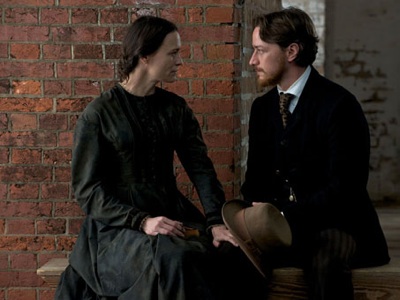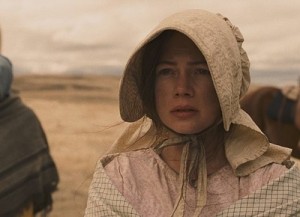 The Conspirator is the first feature from The American Film Company, which was set up three years ago by Ameritrade founder Joe Ricketts “to produce engaging, historically accurate films from America’s storied past.” That is a fine and noble goal, and The Conspirator, which takes place as the Lincoln assassination unfolds, certainly looks accurate in its production details. (Given that our union is lousy with historians, scholars, reenactors, etc., who specialize in the minutiae of the Civil War era, it should.) But fidelity to the clothing, weapons, and china patterns of bygone days is only one component of historical accuracy. Director Robert Redford has reshaped a story of its time into a story of our own, with mixed results.
The Conspirator is the first feature from The American Film Company, which was set up three years ago by Ameritrade founder Joe Ricketts “to produce engaging, historically accurate films from America’s storied past.” That is a fine and noble goal, and The Conspirator, which takes place as the Lincoln assassination unfolds, certainly looks accurate in its production details. (Given that our union is lousy with historians, scholars, reenactors, etc., who specialize in the minutiae of the Civil War era, it should.) But fidelity to the clothing, weapons, and china patterns of bygone days is only one component of historical accuracy. Director Robert Redford has reshaped a story of its time into a story of our own, with mixed results.
Not the most rousing filmmaker Redford does gets the film off to a fast start, with a tense restaging of the killing, the literal coup de thÁ©Á¢tre of a plan also aimed at the vice president and secretary of state. A manhunt is quickly mounted. Arrested and charged with conspiracy are seven men and one woman, Mary Surratt (Robin Wright). Surratt is the owner of the boarding house where John Wilkes Booth (Toby Kebbell) and his associates plotted the simultaneous attacks. A Union war hero turned lawyer, Frederick Aiken (James McAvoy), is drafted to defend the taciturn Surratt before a military tribunal. The unwanted assignment turns out to be anything but cut-and-dried as Aiken realizes that Surratt has been detained to smoke out her own son, John (Johnny Simmons), the one conspirator to have escaped justice. Aiken’s newfound zeal puts him at odds with Lincoln’s secretary of war, Edwin Stanton (Kevin Kline), whose interest in results trumps all other considerations.
 Screenwriter James Solomon wrote The Conspirator in 1993. It goes without saying that a lot has happened in America in the last 18 years, and Redford encouraged him to develop the parallels to our own queasy “war on terror” as his script finally reached the screen. You’d think that after the disaster <!–more–> of 2007’s Middle Est-themed Lions for Lambs Redford would want to stay away from this subject, a non-starter with critics and audiences alike, but for some time disguising the takeaway beneath the historical trappings works. Aiken’s mentor, Maryland jurist Reverdy Johnson (Tom Wilkinson), bristles at having to take a loyalty oath, a ploy that immediately muddies the judicial waters. Surratt, who insists to Aiken that she is “a Southerner, a Catholic, a devoted mother, but no assassin,” is not allowed to speak in her own defense, just one of many flashpoints for Aiken, who believes she should have been tried in a civilian court with less arbitrary rules. “Abandoning the Constitution is not the answer,” Aiken says as the gallows looms. “In our grief let us not betray our better judgment and take part in an inquisition.”
Screenwriter James Solomon wrote The Conspirator in 1993. It goes without saying that a lot has happened in America in the last 18 years, and Redford encouraged him to develop the parallels to our own queasy “war on terror” as his script finally reached the screen. You’d think that after the disaster <!–more–> of 2007’s Middle Est-themed Lions for Lambs Redford would want to stay away from this subject, a non-starter with critics and audiences alike, but for some time disguising the takeaway beneath the historical trappings works. Aiken’s mentor, Maryland jurist Reverdy Johnson (Tom Wilkinson), bristles at having to take a loyalty oath, a ploy that immediately muddies the judicial waters. Surratt, who insists to Aiken that she is “a Southerner, a Catholic, a devoted mother, but no assassin,” is not allowed to speak in her own defense, just one of many flashpoints for Aiken, who believes she should have been tried in a civilian court with less arbitrary rules. “Abandoning the Constitution is not the answer,” Aiken says as the gallows looms. “In our grief let us not betray our better judgment and take part in an inquisition.”
From the tyrannies of the Bush administration in pursuing its smoke-and-mirrors war to the cowardice of Obama’s in letting a military tribunal mete out justice for 9/11 this all has a familiar ring to it. But Redford and Solomon, tough on the new government, soften Surratt, who speaks of “the cause” without putting a name to it (“the cause” of slavery?). If this were a movie about a 9/11 trial (and you can’t say anyone’s acting in haste this time, indeed much the opposite problem) would Redford let the defendants get off with a relative wrist slap? Surratt is a cipher, embalmed in victimhood, which doesn’t give Wright much to play (intrigue involving her daughter, portrayed by Evan Rachel Wood, swirls along the edge of the movie but doesn’t enliven its center). There is the spark of a decent idea, as Surratt comes to see Aiken (the as usual somewhat undefined McAvoy) as a good son in place of her own, but the scenes are tentative. To make art from history requires more rigor than The Conspirator supplies.
That said there is an audience for a movie like this, and Redford (idlng since the directorial peaks of Ordinary People and Quiz Show) is if nothing else conscientious about delivering what it expects: Decent if not spectacular acting from a cast wearing mustaches, beards, and bonnets (though no amount of facial hair could ever make Justin Long appear to be a citizen of the 19th century), handsome, if modestly budgeted, design (shot in Savannah the movie has a silvery glow to it, courtesy of DP Newton Thomas Sigel), and food for thought. Not quite enough for a full and satisfying meal, however.
[kml_flashembed movie="http://www.youtube.com/v/iSvG_gk2mZU" width="600" height="344" allowfullscreen="true" fvars="fs=1" /]
“Engaging” is not the word that leaps to mind in describing for the historical-ish Meek’s Cutoff, a movie that looks like a Western (it was shot in the boxy 1.33:1 aspect ratio, the frame of John Ford and other pioneers of the form) but doesn’t act like one. Director Kelly Reichardt, whose gentle Old Joy (2006) and harrowing Wendy and Lucy (2008) are regarded as among the best American independent films in recent years, transports us past the Civil War, to Oregon in 1845, as a wagon train limps across the inhospitable deserts in the eastern part of the state. The first 10 minutes pass in silence, with only a single word, whittled on a piece of wood: “Lost.”
 There is a guide, the talkative braggart Meek (Bruce Greenwood, completely unrecognizable under a super-scraggly beard that Redford and Joe Ricketts would surely have vetoed). But the men, having split their wagons from a larger party, are unsure of themselves and refuse to speak up as he leads them further into nowhere. The capture of a Native American (played by stuntman Rod Rondeaux, a member of the Crow tribe) is a catalyst for action among the women, with Emily (Michelle Williams) deciding to trust him over the surly Meek, who urges the group to hang the Indian as a spy.
There is a guide, the talkative braggart Meek (Bruce Greenwood, completely unrecognizable under a super-scraggly beard that Redford and Joe Ricketts would surely have vetoed). But the men, having split their wagons from a larger party, are unsure of themselves and refuse to speak up as he leads them further into nowhere. The capture of a Native American (played by stuntman Rod Rondeaux, a member of the Crow tribe) is a catalyst for action among the women, with Emily (Michelle Williams) deciding to trust him over the surly Meek, who urges the group to hang the Indian as a spy.
This makes the movie sound like a good old-fashioned oater, told from a feminist perspective. But it isn’t. Besides directing Meek’s Cutoff (from a script by Jon Raymond, who wrote those other two films, plus three episodes of HBO’s Mildred Pierce) Reichardt also edited the picture, and if she wants to linger on shots of clouds passing by the moon she will. The movie is in a kind of trance, enthralled by the hostile landscapes (shot very starkly by Chris Blauvelt) and a plangent score (by Jeff Grace, a fast-rising talent) that speaks more loudly than words. Except for the mumbly Meek no one speaks much at all, and Reichardt has purged her New York-drawn cast (Williams, plus Zoe Kazan and Paul Dano, among others) of their usual mannerisms. The movie is as pure as an oasis.
While the film details a transference of power it does so simply, with a gun raised not to enforce order but to signal a change in a wearying routine and stalemate. Emily’s courage comes from necessity, and not from nowhere–we see all along how the women (who don’t always stick together, as they would in a more standard-issue treatment) hold the camp together, and it’s fitting that the tide should turn their way, or at least her way. But Reichardt doesn’t raise her voice to tell us this, and the road ahead is left unclear. Artful, original, and baffling, Meek’s Cutoff is a movie that makes you come to it, and if you can make that commitment your patience may be rewarded–though not in the usual glib way.
[kml_flashembed movie="http://www.youtube.com/v/AEmL9at6JT0" width="600" height="344" allowfullscreen="true" fvars="fs=1" /]




Comments